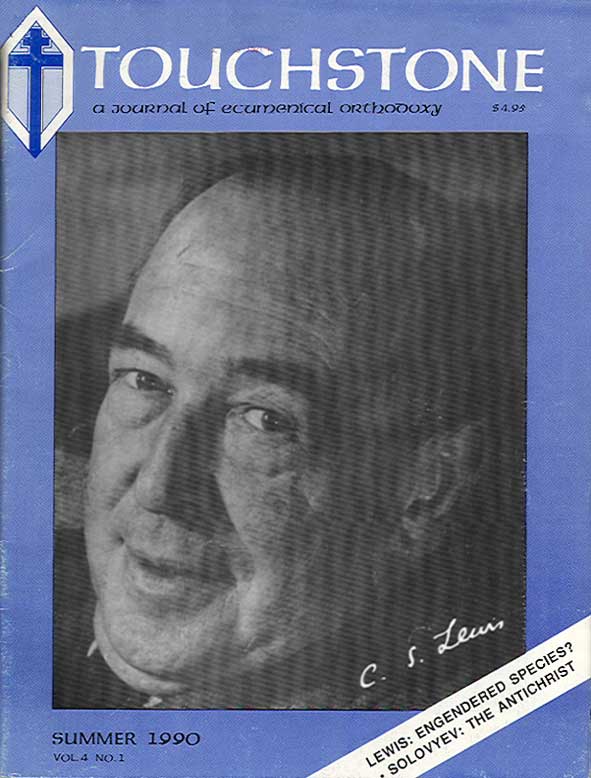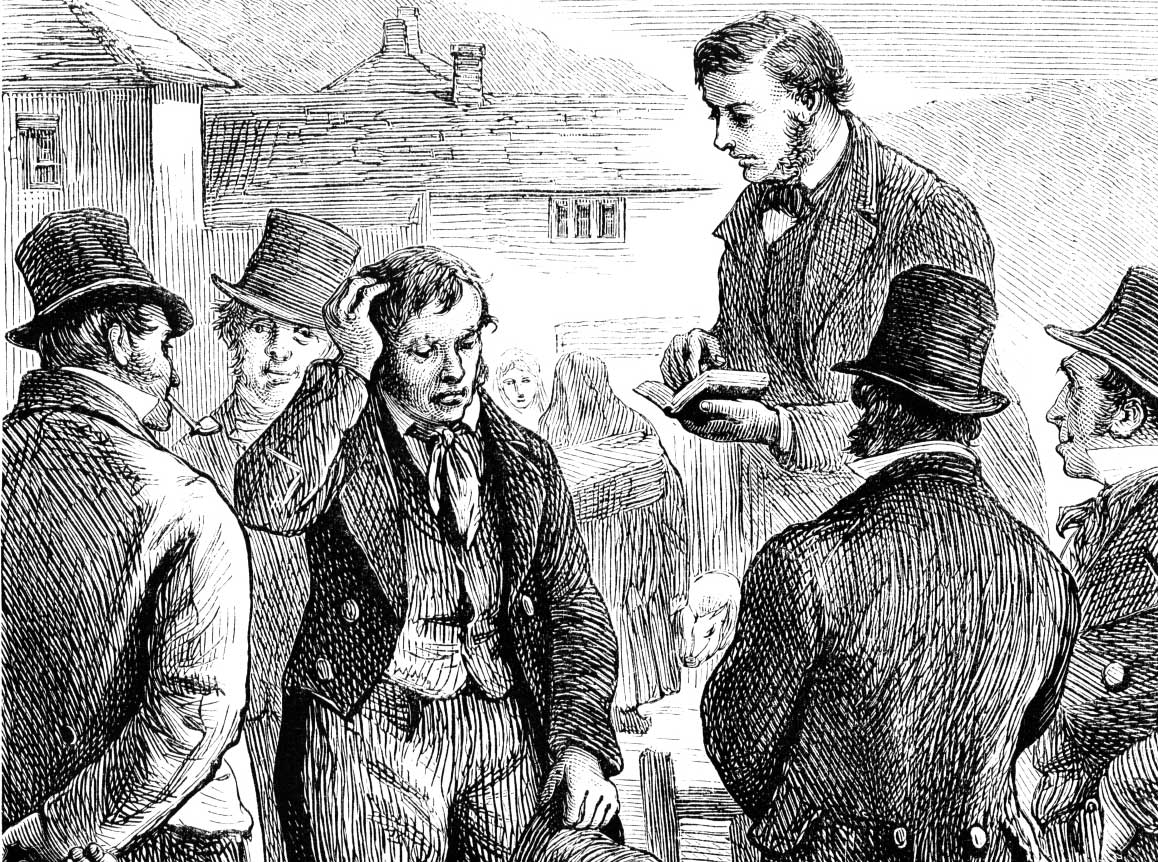C. S. Lewis on Gender Language in the Bible
A Caution
by Wayne Martindale
For most Americans, the issue of gender language in the Bible seems quite contemporary. For example, a professional association of homiletics professors decided a few months ago that they would dispense with gender language when referring to God and the Bible in their own meetings. But C. S. Lewis, so often perceptive about the way the wind of ideas is blowing, wrote about this and a related concern as early as 1948 in his God in the Dock article “Priestesses in the Church?” To those who wish to tamper with the biblical imagery referring to God as “He” and “Father,” Lewis issues a caution.
But first, to give them their due, Lewis states the opposition well and fairly:
Common sense, disregarding the discomfort, or even the horror, which the idea of turning all our theological language into the feminine gender arouses in most Christians, will ask “Why not? Since God is in fact not a biological being and has no sex, what can it matter whether we say He or She, Father or Mother, Son or Daughter?”1
Perhaps the prior question is why we wish to change. Is our concern to purify our conception of God? When we approach the issue, as Lewis points out, we must first agree with those who say we err when we allow our language about God to confine our concept of Him. If our use of masculine words to refer to God causes us to reduce our conception to an anthropomorphic finitude, then we are in trouble. Lewis is often working to expand our ideas of the vastness of God. The very universe demands an expansive view and was perhaps created on such a mind-boggling scale to communicate the greatness of God, as suggested by this passage of exalted praise from the end of Perelandra:
“Yet this seeming dialogue also is the end and final cause for which He spreads out Time so long and Heaven so deep; lest if we never met the dark, and the road that leads nowhither, and the question to which no answer is imaginable, we should have in our minds no likeness of the Abyss of the Father, into which if a creature drop down his thoughts for ever he shall hear no echo return to him. Blessed, blessed, blessed be He!”2
We must acknowledge at the outset that any attempt to name or describe God is fraught with problems. What shall we try? If we cease to refer to God as either male or female, we must stop referring to God as a person at all. Lewis illustrates the problem of using abstract terms: “‘Bright blur’ is not a very good description. In fact,” Lewis laments, “you can’t have a good description of anything so vague. If the description became good it would become false.”3 If we think of God in terms of abstractions, we will be further from the truth, not nearer. As Lewis explains in Miracles:
If anything is to exist at all, then the Original Thing must be, not a principle nor a generality, much less an ‘ideal’ or a ‘value,’ but an utterly concrete fact.
. . . We must beware, as Professor Whitehead says, of paying God ill-judged ‘metaphysical compliments.’ We say that God is ‘infinite.’ In the sense that His knowledge and power extend not to some things but to all, this is true. But if by using the word ‘infinite’ we encourage ourselves to think of Him as a formless ‘everything’ about whom nothing in particular and everything in general is true, then it would be better to drop that word altogether. Let us dare to say that God is a particular Thing. Once He was the only Thing: but He is creative, He made other things to be. He is not those other things. He is not ‘universal being’: if He were there would be no creatures, for a generality can make nothing. He is ‘absolute being’—or rather the Absolute Being—in the sense that He alone exists in His own right.”4
If we accept the biblical view at all, then we must agree with Lewis that “God . . . has purposes and performs particular actions, . . . does one thing and not another, [is] a concrete, choosing, commanding, prohibiting God with a determinate character.”5 Does it not then follow that one who “purposes and performs particular actions” is more like a person than anything else we can think of? That God is, in fact, a person—an entity with self-conscious personhood, feelings, intentionality and so on—seems unavoidable. Lewis has argued the point brilliantly in the first two books of Mere Christianity without making any reference to Scripture. And for those that claim any authority for Scripture at all, personhood is evident. How else may the words of Jesus about his coming be understood (say in John)? What could the Incarnation mean? What does it mean for us to be “in His image”? On this point, Lewis concludes:
To believe that God—at least this God—exists is to believe that you as a person now stand in the presence of God as a Person. What would, a moment before, have been variations in opinion, now become variations in your personal attitude to a Person. You are no longer faced with an argument which demands your assent, but with a Person who demands your confidence.6
Try as we may, it is impossible for human beings to think of God without personhood, and it is equally impossible to think of a person without gender. Did this problem of knowing God and how human beings would refer to Him and think of Him escape God in the creation of gender? Or did He create a system which would adequately allow for us to conceptualize and talk about Him, and did He give us a divine revelation of the imagery we should use? Is it not more credible, given the supreme importance of knowing God rightly, that He should, in fact, create gender for the purpose of revelation? Lewis suggests that “one of the ends for which sex was created was to symbolize to us the hidden things of God.”7
In Lewis’s view, gender is more than just male and female, and much more than sexuality. He gives his view through both the narrator and Ransom, the chief character in Perelandra. As Ransom relates his having seen the Oyarsa or ruling angels of Malacandra (Mars) and Perelandra (Venus), the language becomes rhapsodic in describing Masculine and Feminine as the larger reality of which male and female sexuality are a small part:
What Ransom saw at that moment was the real meaning of gender. Everyone must sometimes have wondered why in nearly all tongues certain inanimate objects are masculine and others feminine. What is masculine about a mountain or feminine about certain trees? Ransom has cured me of believing that this is a purely morphological phenomenon, depending on the form of the word. Still less is gender an imaginative extension of sex. Our ancestors did not make mountains masculine because they projected male characteristics into them. The real process is the reverse. Gender is a reality, and a more fundamental reality than sex. Sex is, in fact, merely the organic adaptation to organic life of a fundamental polarity which divides all created beings. Female sex is simply one of the things that have feminine gender; there are many others, and Masculine and Feminine meet us on planes of reality where male and female would be simply meaningless. Masculine is not attenuated male, nor feminine attenuated female. On the contrary, the male and female of organic creatures are rather faint and blurred reflections of masculine and feminine. Their reproductive functions, their differences in strength and size, partly exhibit, but partly also confuse and misrepresent, the real polarity.8
This greater truth includes the fact that, to the returning Christ, we all have a feminine relationship: we are His bride. The implications of such language include the following: He is our protector; He initiates the relationship; He provides for our needs.
But the main issue is the nature of revelation. Is the biblical revelation flawed on the point of gender language? Then the consequences are clear and radical. What Lewis says of women in the priesthood applies equally to gender language:
The Church claims to be the bearer of a revelation. If that claim is false then we want not to make priestesses but to abolish priests. If it is true, then we should expect to find in the Church an element which unbelievers will call irrational and which believers will call supra-rational. There ought to be something in it opaque to our reason though not contrary to it—as the facts of sex and sense on the natural level are opaque. And that is the real issue. . . . If we abandon that, if we retain only what can be justified by standards of prudence and convenience at the bar of enlightened common sense, then we exchange revelation for that old wraith Natural Religion.9
With merely human constructs, we may change terms and cultural ideas as often as we like. Where revelation and divinity is concerned, however, “We cannot shuffle or tamper so much. With the Church, we are farther in: for there we are dealing with male and female not merely as facts of nature but as the live and awful shadows of realities utterly beyond our control and largely beyond our direct knowledge. Or rather, we are not dealing with them but (as we shall soon learn if we meddle) they are dealing with us.”10
If the reason for wishing a change in gender language is to accommodate cultural changes in attitude, then we have a clear answer from Scripture already: “If any one is preaching to you a gospel contrary to that which you received, let him be accursed. Am I now seeking the favor of men, or of God? If I were still pleasing men, I should not be a servant of Christ.” (Gal. 1:9–10). The question ought to be, “What pleases God?” And would not the warning of John apply? “I warn everyone who hears the words of the prophecy of this book: If anyone adds anything to them, God will add to him the plagues described in this book. And if anyone takes words away from this book of prophecy, God will take away from him his share in the tree of life and in the holy city, which are described in this book.” (Rev. 22:18–19) Those are strong warnings about tampering with Scripture.
Apparently, many think they have the liberty to change the way we refer to God to suit their sense or what is right and fair and just. And no one need doubt that their motives are less than pure in these terms. But right and just by what standard? A cultural norm? Shall we put culture ahead of inspiration? That is to jettison the authority of Scripture altogether. Be honest and throw out the idea of the Bible as having any special authority at all. But that is, of course, to cease being a Christian. If we accept biblical authority, however, we arrive with Lewis at this conclusion:
Christians think that God Himself has taught us how to speak of Him. To say that it does not matter is to say either that all the masculine imagery is not inspired, is merely human in origin, or else that, though inspired, it is quite arbitrary and unessential. And this is surely intolerable: or, if tolerable, it is an argument not in favour of Christian priestesses [or changes in biblical gender language] but against Christianity. It is also surely based on a shallow view of imagery. Without drawing upon religion, we know from our poetical experience that image and apprehension cleave closer together than common sense is here prepared to admit; that a child who has been taught to pray to a Mother in heaven would have a religious life radically different from that of a Christian child. And as image and apprehension are in an organic unity, so, for a Christian, are human body and human soul.11
Some are concerned that using masculine language denigrates women. But surely not, for with respect to God, we are all feminine (the bride of Christ). Should we be scandalized that Jesus came as a man? How could we be when the honor of bringing his physical body into the world fell to a woman? Or when we remember that His first appearance after his resurrection was to women? Or when Paul says that in Christ there is neither male nor female (which means the we are equal, not that we cease having gender)? In light of this, are those for gender changes in the Bible not guilty of reverse prudishness?
If the modern sensibility is troubled by gender language, Lewis’s advice to one of his correspondents who is worried about a confusing passage will serve very well. Lewis writes that baffling, even shocking passages in the Bible must be allowed to stand. He explains that our responsibility, when we don’t understand certain passages is to let them alone until a greater person will come along who knows how to read them rightly. When a person does come to understand such passages, Lewis explains, the result will be that God will appear “good and just and gracious in ways we never dreamed of.”12
And what should our attitude be when, all about, the voices of theologians go up in a demand for changes in gender language in the Bible? Can we afford to ignore the experts? Here is a final caution from Lewis: “When you turn from the New Testament to modern scholars, remember that you go among them as a sheep among wolves. Naturalistic assumptions, beggings of the question . . . will meet you on every side—even from the pens of clergymen.”13 There is only one safe course: let us not try to conform the Word of God to suit our own standards, but let us conform our standards to suit the Word of God.
All men are like grass,
and all their glory is like the flowers of the field;
the grass withers and the flowers fall,
but the word of the Lord stands forever.
(1 Pet. 1:24–25)
Notes:
1. “Priestesses in the Church?” (1948), God in the Dock, (Grand Rapids, Michigan: Eerdmans, 1970), p. 237.
2. Perelandra, (New York: Macmillan), p. 218.
3. Letters to Malcolm: Chiefly on Prayer, (New York: Harcourt, 1964), p. 83.
4. Miracles, (New York: Macmillan, 1960), p. 87.
5. Miracles, p. 81.
6. “On Obstinacy in Belief” (1955), The World's Last Night and Other Essays, (New York: Harcourt, 1960), p. 26.
7. “Priestesses,” p. 238.
8. Perelandra, p. 200.
9. “Priestesses,” p. 238.
10. “Priestesses,” p. 239.
11. “Priestesses,” p. 237.
12. Letters of C. S. Lewis (8 August 1953), ed. W. H. Lewis, (New York: Harcourt, 1966), p. 253.
13. Miracles, (New York: Macmillan, 1960), p. 164.
Dr. Wayne Martindale is Professor of English at Wheaton College, Wheaton, Illinois, and co-editor of The Quotable Lewis (Grand Rapids: Zondervan, 1990).
Wayne Martindale is a professor of English at Wheaton College in Wheaton, Illinois.
subscription options
Order
Print/Online Subscription

Get six issues (one year) of Touchstone PLUS full online access including pdf downloads for only $39.95. That's only $3.34 per month!
Order
Online Only
Subscription

Get a one-year full-access subscription to the Touchstone online archives for only $19.95. That's only $1.66 per month!
bulk subscriptions
Order Touchstone subscriptions in bulk and save $10 per sub! Each subscription includes 6 issues of Touchstone plus full online access to touchstonemag.com—including archives, videos, and pdf downloads of recent issues for only $29.95 each! Great for churches or study groups.
Transactions will be processed on a secure server.
more on C. S. Lewis from the online archives
more from the online archives
calling all readers
Please Donate
"There are magazines worth reading but few worth saving . . . Touchstone is just such a magazine."
—Alice von Hildebrand
"Here we do not concede one square millimeter of territory to falsehood, folly, contemporary sentimentality, or fashion. We speak the truth, and let God be our judge. . . . Touchstone is the one committedly Christian conservative journal."
—Anthony Esolen, Touchstone senior editor












